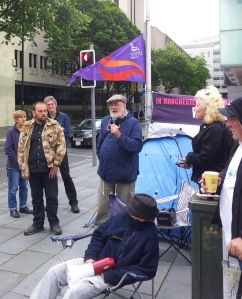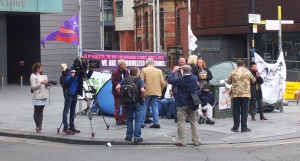An unequal battle occurred in court on July 30th, resulting in a city wide injunction being ordered against homeless protest camps. Manchester City Council (MCC) were represented by their usual counsel, barrister Arron Walthall , the homeless protest camps were represented, without counsel, by solicitor Ben Taylor working pro bono as repeated appeals for legal aid had been turned down by the legal aid board. Due to the two named defendants in the case (Wesley Dove and Elizabeth Hodgkinson) being repeatedly denied legal aid Taylor planned to launch “a judicial review of the legal aid agency, and that is what I am going to be seeking to do if we adjourn this today”
The judgement of district judge Ranji Matheru is the culmination of a long running battle between MCC and the homeless protest camps (reported in the Manchester Mule here). The injunction bans the use of any tents or temporary and removable forms of accommodation within the defined limits of Manchester city centre (limits reported in the Mule here). The injunction initially sought by MCC was against “persons unknown” would apply to not only homeless protestors but to anyone using a temporary shelter; hence Taylor describing it in court as “an injunction against the whole world”. The criminal sanction of up to 2 years in jail is possible for anyone breaking the injunction. The judge ordered the terms of the injunction to be tightened up to aid clarity, possibly by a list of excluded structures and named defendants rather than persons unknown. The Injunction is to run for a set time limit, which could be up to two years, yet to be determined.
A solidarity sleep over protest was started on the previous day to the court case, with a small group of tents pitched in front of Manchester Civil Justice Courts. In the morning before the court case a number of people spoke to the gathered protestors in support of the homeless protest camps, including Rhetta Moran (RAPAR) and John Clegg (Unite Community Branch Grt Man.).
Scott Russell took part in the sleep over protest, and was a former member of the homeless protest camp, who was rehoused. He said he was there ‘supporting the homeless like I always have done, because it is so easy to slip into it, and its really hard to get out of it.’
the Exceptional Case Funding merit test is wholly unsatisfactory
Russell had also been part of the group (which included homeless people, activists and Unite Union members) in talks with the forward planning committee for homelessness of MCC. The aim of these fortnightly talks, which started on the 5 of June (reported here), was to come up with a new improved plan for the homelessness services of MCC. Scott said of the meetings “They ceased all talks with us last week and they were supposed to be making an appointment but they said ‘oh we’ve cancelled it’, they cancelled the meeting apparently three days before but no one told us about it.” A spokesperson from MCC said “It was felt that the Council needed to focus its efforts on direct discussion with homeless people, both those within the camp and also other rough sleepers who wanted to share their experiences and views”
The “belt and braces” legal strategy adopted by MCCs counsel to acquire the city wide injunction, was to cite the Local Government act of 1972 section 222, trespass laws and planning laws. Walfall said, during the trial, that the injunction would not include “sleeping bags, benches or cardboard boxes”. He also informed the court that MCC had spent “in excess of £100k” in their dealings with the protest camps.
The defendants tents were their homes, they had no other.
Initially Taylor asked for another adjournment to the case for the reason that legal aid had been refused to the defendant by the legal aid board after repeated appeals to them; because they did not pass the merit tests for Exceptional Case Funding (ECF). Taylor cited a report a recent report by Lord Chancellor J. Collins, which stated that “the Exceptional Case Funding merit test is wholly unsatisfactory” and that it was “apparent the ECF fund is to complex”. Taylor wished to launch a judicial review on the ECF funding criteria. The judge refused the adjournment, stating the decision to go ahead with case whether funding was available or not in the last court appearance(reported in the Mule here).
Defending the homeless Taylor raised there Article 8 rights of the ECHR which states ‘Everyone has the right to respect for his private and family life, his home and his correspondence’. He told the court that “The defendants tents were their homes, they had no other.”
The judge ordered the eviction of the camps in Castlefield and St Ann’s square on the grounds of trespass. She granted the injunction sought by MCC under the Local Government act of 1972, section 222. Summing up her decision she said the Article 8 rights of the defendants were not engaged in this case and highlighted the costs already incurred and the prospect of further costs if the protest camps continue.
I mean how many people die on the streets, you know its so dangerous
Nicola Moore is a voluntary worker who helps the homeless people of Manchester. Moore has been a long time supporter of the protest camps and came today “because what Manchester Council is doing is absolutely criminal. I mean how many people die on the streets, you know its so dangerous. We have had people who have been gang raped on the streets.” After the decision of the court had been reached Moore was further outraged “ it was absolutely disgusting, I cant believe just how disgusting it was.” and added “They didn’t get legal aid after three attempts at it. He [Taylor] didn’t have counsel, there was no one to help him research.”
The courtroom was packed with supporters of the homeless protest camps when the Judge announced her decision, many supporters left the courtroom visibly and audibly upset and angry at the decision made. A sombre Taylor said after the case “I am disappointed with the outcome and will now consider whether there are any prospects on appeal”
Cllr Nigel Murphy, Executive Member for Neighbourhoods for Manchester City Council, on the 31st July said: “We are pleased that the courts have granted the exclusion order we asked for, which is specifically designed to prevent the recurrence of camps and not targeted at individual rough sleepers.” He went on to add “”We will now be working with Greater Manchester Police and court bailiffs to regain possession of the site as soon as possible. Our homeless team will also be visiting the camps … to offer support, guidance and accommodation to anyone who requires it.”
The finalised injunction order was reported on by RAPAR on the 5th of August. It was an ameliorated version of the injunction initially sought by MCC. No longer “an injunction against the whole world” instead it was only serviceable against people “erecting and/or occupying tents or other moveable temporary forms of accommodation for the purposes of or in connection with protests or similar events arising from or connected with the Claimant’s [Manchester City Council’s] homeless policy on land”. The order also provides a list of what is not considered temporary forms of accomodation:
a. Sleeping bags / blankets
b. Cardboard boxes
c. Benches
d. Doorways
e. Bus shelters
f. Hostel accommodation
g. Overnight charity accommodation
The injunction order issued is much weaker than the one MCC inititally sought, in the words of Taylor “It would be for the Claimant [MCC] to prove that the contemnor [person in contempt of injunction] is in breach, NOT for the individual to prove that he/she has not breached. This is a very high hurdle for Manchester City Council to get over. In particular, how could Manchester City Council prove that someone is protesting about its Homeless Policy short of the individual holding a placard stating as much?”
The homeless protest camps have not yet been served with orders for eviction from their current sites in St Ann’s Square and Castlefield. If they move to another site after being evicted MCC will find it very hard to serve the injunction on them and make it stick. Could this be a turning point leading to MCC changing their strategy? Maybe council officials are wondering if they could actually prevent homlessness occuring in the first place and improve homelessness services within the city, rather than chasing homeless people through the courts?




Pingback: Third eviction for Manchester homeless protest camp | Cycling Scientist
Pingback: Homeless camp in court facing 4th eviction this year | Cycling Scientist